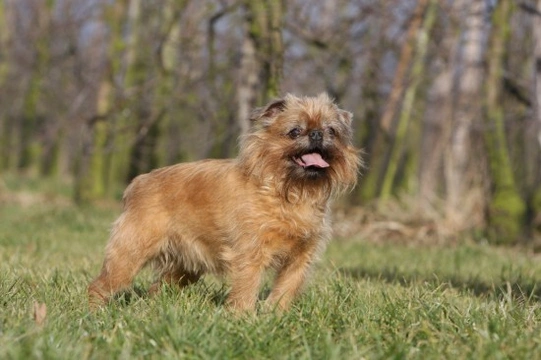
Griffon Bruxellois longevity and hereditary health
The Griffon Bruxellois is a small breed of dog that falls into the toy dog category, and is also sometimes known as the Brussels Griffon. They come in two varieties, being rough coated and smooth coated, and to further add confusion, the smooth coated version is also sometimes called the Petit Brabancon! They are distinctive looking little dogs with a square build and rather monkey-like face, with relatively large heads in relation to the body size.
They weigh between 4.5-5kg, and can be found in a range of colours including brown, black, tan or red, and can also have white markings. Smooth coated dogs of the breed are relatively easy to care for, but the rough coated variety requires regular brushing and grooming to keep their coats in good condition and free of knots.
The Griffon Bruxellois shares many temperament traits with terriers, being mischievous, full of beans and with lots of character. They are a good choice of pet for people who want a small dog that is not the typical lapdog, instead being more robust, lively and generally outgoing.
If you are wondering if the Griffon Bruxellois is the right choice of pet for you, it is important to look into the general health and hereditary background of the breed in detail before committing to a purchase, so that you will be able to develop a complete picture of their general health and wellness. In this article, we will look at the longevity and hereditary health of the Griffon Bruxellois in more detail. Read on to learn more.
Griffon Bruxelloiss longevity
The average lifespan of the Griffon Bruxellois is relatively wide ranging, with breed figures indicating the average to be anything between 10-15 years. The breed as a whole is one that is known to suffer from certain hereditary health problems across some breed lines, which contributes to the premature death of some of the dogs at the lower end of the spectrum.
Conformation
The short, brachycephalic muzzle of the Griffon Bruxellois can pose some problems for the breed, depending on the degree to which the muzzle is shortened. Trouble regulating body heat, and in some cases, breathing problems may affect some dogs of the breed. Due to the protruding eyes of the breed, they are also at risk of scratches and damage to the eyes when going about their normal lives.
The small body and relatively large head of the breed also means that delivering puppies can be a challenge, and means that a significant number of dogs of the breed need to be delivered by caesarean section.
Genetic diversity
The coefficient of inbreeding figure for the Griffon Bruxellois is 9.7%, which is high enough to potentially place dogs of the breed at risk of inbreeding and the associated problems that accompany this. Breeders of the Griffon Bruxellois are advised to reduce the coefficient of inbreeding statistic within their own breed lines where possible.
Health tests for the Griffon Bruxellois
A couple of specific health problems that are hereditary within the Griffon Bruxellois gene pool as a whole are known to affect a reasonably large number of dogs of the breed, and the British Veterinary Association recommends pre-breeding screening for these conditions in potential parent dogs. These conditions are:
- Hereditary cataracts, a disorder of the eye.
- Chiari malformation syringomyelia, a condition caused by a malformation of the occipital bone of the skull. This malformation causes the skull to compress the rear of the brain, leading to pockets of fluid developing on the spinal cord. This condition is incredibly painful and unpleasant for affected dogs.
Other health concerns
As well as the conditions mentioned above that can be tested for prior to breeding, the Griffon Bruxellois is also known to have an elevated risk of suffering from a range of other potential health problems too. No pre-breeding screening is currently available for these conditions, and so all potential Griffon Bruxellois buyers should familiarise themselves with these conditions before committing to a purchase. These conditions include:
- Patellar luxation, a condition that affects the knee caps due to the muscles and ligaments that hold them in place being incorrectly constructed. This leads to potential dislocation, which may require surgical correction.
- Vitreal syneresis, a condition that causes floating particles to collect in the lubricating fluid of the eyes.
- Persistent hyaloid artery, another congenital eye condition.
- Cleft palate, a developmental anomaly that occurs in the womb, and causes affected dogs to be born with a cleft. This means that the puppies, when born, are unable to suckle normally and gain enough food, and so generally proves fatal. However, if the puppy can be fed up until the age at which corrective surgery can be performed, the condition can often be corrected.
- Due to the short, brachycephalic muzzle of the breed, they may be prone to overheating and heat stroke in hot weather.



